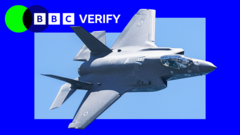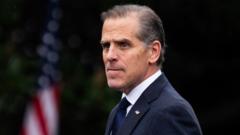UK Foreign Secretary David Lammy has criticized Israel's actions in Gaza, raising questions about the UK's arms sales and military collaboration with Israel. While the UK is not a top arms supplier, the government faces calls for greater transparency and accountability following the ongoing humanitarian crisis.**
Scrutiny Grows on UK Arms Sales Amid Gaza Conflict**

Scrutiny Grows on UK Arms Sales Amid Gaza Conflict**
As the UK faces pressure regarding its military ties to Israel, key government officials advocate for accountability and reassessments of arms exports.**
UK Foreign Secretary David Lammy has recently issued a strong condemnation of Israel's military actions in Gaza, expressing dissatisfaction with the lack of effective intervention from the international community to end the conflict. His remarks come amidst mounting public scrutiny regarding the extent of military assistance the UK provides to Israel, particularly following the onset of the recent conflict after the October 7 attacks.
Though the UK is not a primary arms supplier to Israel— with the US occupying that position, followed by Germany and Italy— it has nonetheless approved arms export licenses to Israel worth over £500 million since 2015. This includes systems used extensively on the F-35 aircraft, which has played a critical role in the Israeli military's operations in Gaza. A significant portion of the components for the F-35 fighter jets are manufactured in the UK, contributing to concerns regarding the nation’s complicity in the ongoing violence.
Lammy indicated the government’s intention to reassess its support, stressing the ethical implications of supplying military equipment amidst allegations of war crimes. He highlighted a historical context of arms export licenses, where approximately 30 licenses have been suspended since the Labour Party came to power, though crucial components for the F-35 remain exempt due to their part in an international manufacturing program.
Professor Anna Stavrianakis, a noted expert in UK arms exports, criticized the government's exemption for F-35 components, labeling it an "enormous loophole". She pointed to the complexities of global arms production, which often complicate accountability measures.
Additionally, it remains ambiguous whether the UK has shared military intelligence with Israel during the ongoing conflict. The Foreign Secretary underscored that the Royal Air Force (RAF) surveillance missions over Gaza have not been intended for military intelligence sharing, albeit emphasizing the UK’s role in tracing hostages taken during attacks by Hamas.
Despite the ongoing toll taken on the civilian population, the current Labour government has yet to impose direct sanctions on Israel for the escalating violence in Gaza. However, they have expressed vocal opposition to the actions taken against civilians seeking humanitarian aid, aligning with a coalition of nations disapproving the military’s recent operations.
As the situation unfolds, the British government is under increasing pressure to demonstrate its commitment to humanitarian principles while balancing its defense partnerships. The fragile relationship dynamics will likely continue to evolve with calls for transparency and accountability becoming more pronounced in political discourse.





















